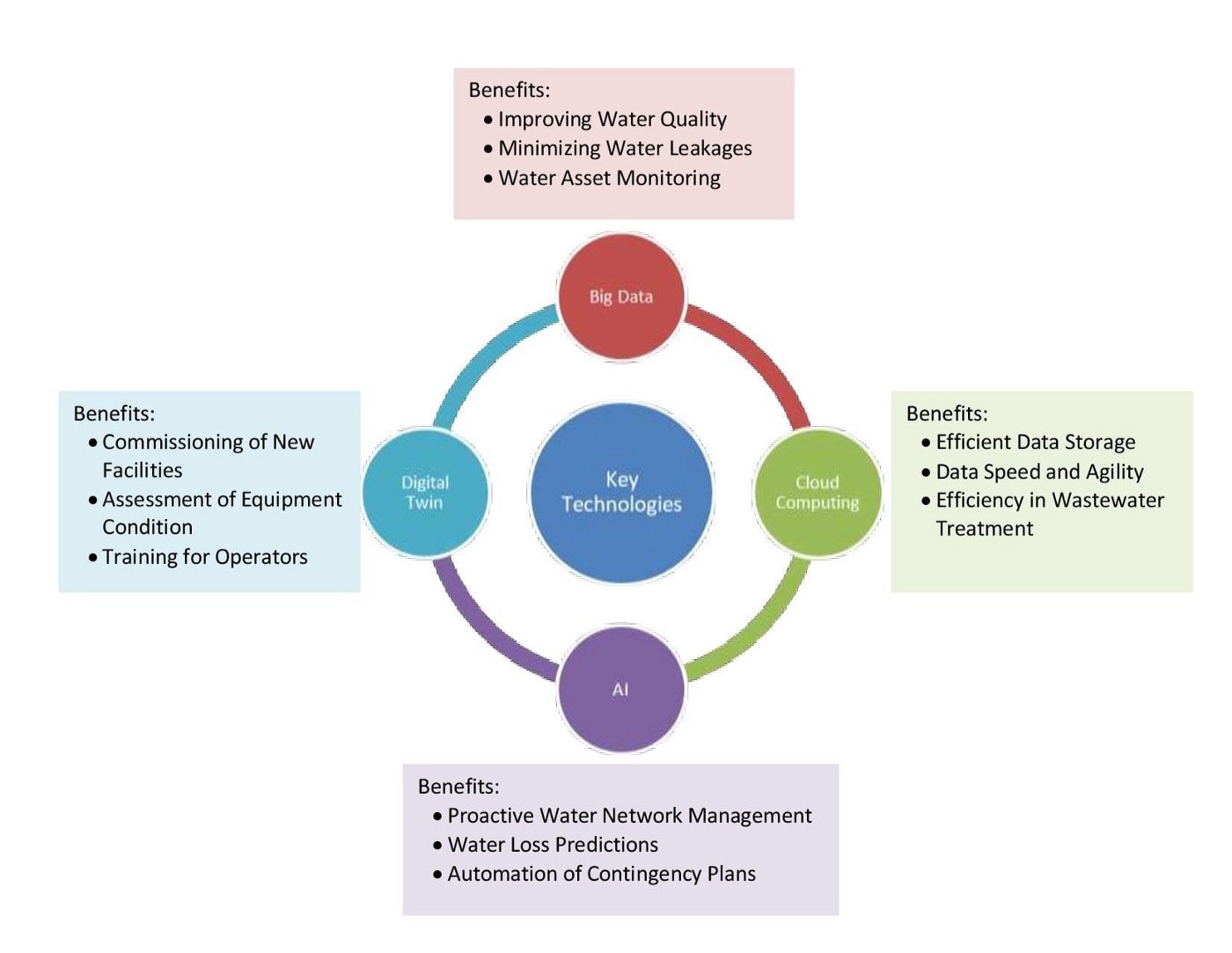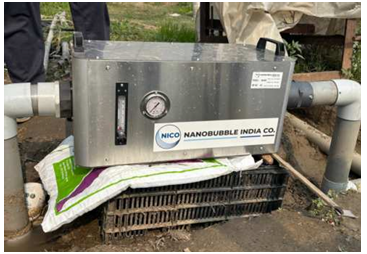By Nideshnavaratharajan, Senior Consultant, Energy & Environment Practice, Frost & Sullivan
The COVID-19 pandemic has revitalized the importance of resilient and future-ready water and wastewater infrastructure across application segments. To become sustainable, resilient, and future-ready, end users have started to adopt net-zero, decarbonization, and circularity goals across their operations, products and service offerings. Digital solutions have become a critical element in helping end-users achieve sustainability and circularity targets. Globally, utilities and industries have significantly increased investments in digital and IoT solutions to reduce energy consumption and improve operational efficiency. Digital technologies such as Artificial Intelligence (AI), analytics, cloud, and digital twin play a key role in transforming the water industry. The application of these advanced technologies helps water resource authorities (both municipal and non-municipal authorities) to address various challenges related to the monitoring of water quality, the improvement of infrastructure asset management, the reduction of leakages, and the reliability of water supply, thereby ultimately ensuring efficient water management.
Global trends transforming the Water and Wastewater Sector are:
Centralized Digital Water Operations: Emerging technologies move siloed water operations to a centralized approach. The data generated from various operations through SCADA, CRM, and ERP are consolidated and analyzed to obtain an integrated view. A centralized repository ensures that data is available in real-time for all operators and can be quickly accessed from any device. The centralized process reduces data lags and accelerates decision-making.
Smart Water Management: Big Data is proving to be a game-changing technology for water utilities for efficient water management. Utilities generate large data volumes collected and analyzed to detect issues in various areas, including pumping stations and water reservoirs. Big Data creates robust analytics solutions that can power water utilities to predict water-related problems accurately and diagnose defects/issues that can cause significant damage.
Asset Optimization and Management: Water asset management is a significant focus area involving substantial initial investments. Detection defects in water assets, including pipes, reservoirs, and pumps, are challenging as water network infrastructure is highly complex and spread across a large geographic area. A virtual environment can be created by leveraging AI/Machine Learning (ML)-based solutions and digital twin, which will help operations managers troubleshoot process efficiencies, detect leaks, and assess the condition of water pipes. The process is safe, consumes less time, and saves costs.
Focus on Improving Water Quality: Owing to the increasing pollution and other environmental factors such as the rising temperature and sewage discharge, water utilities struggle to maintain water quality. In addition, the expanding population, the increasing trend of industrialization, the rapidly growing economic activity, and the intensification of agricultural activity have led to water pollution. Implementing advanced technologies like IoT and digital twin will progressively improve water quality. These technologies can proactively identify pollution levels in water and significantly enhance the process of water quality treatment through the regular generation of predictive insight.
Zero-Carbon Footprint: Water utilities worldwide are exploring various options to implement the climate action Net Zero plan. They reassess existing water infrastructure and implement advanced technologies to enable water management and energy efficiency plans as a significant step. Utilities are also looking for water- and chemical-efficient solutions. Efficiency has become a fundamental requisite in most new greenfield projects. Furthermore, sustainability and circular economy are pushing the adoption of advanced technology solutions.
The above trends are driving the demand for digital solutions in the water industry, and four key technologies are expected to witness high adoption in the long term. Big Data, cloud, AI, and digital twin are four key technologies playing a crucial role in efficient water management. These technologies are transforming the management of water utilities by empowering operators to manage and analyze large data volumes, take informed decisions through AI-generated insight, and improve overall operations through digital replicas of equipment.
Exhibit 1: Global Technology Trends and Benefits, 2022
Although advanced technologies hold significant potential in improving operational efficiencies, the global water industry remains slow to adopt digital technologies. This is mainly due to the fragmented nature of the industry, which makes it challenging to implement new technologies across the entire ecosystem. However, traditional water management means will no longer suffice with the rapidly changing landscape, and digital technologies will gain traction soon.
The Indian water and wastewater market is growing, with industrial and municipal segments offering growth opportunities. High industrial growth, rapid urbanization, associated economic activities, and groundwater depletion are expected to outweigh growth restraints, resulting in market growth in the coming years. The Indian water and wastewater market has a potential of more than ₹350 billion by 2030.
Burgeoning demand for water, climate change, aging water infrastructure system, contamination or depletion of water sources are the key challenges the Indian water and wastewater sector faces. Digital transformation would play an important role by enabling utilities and industrial companies to address their key challenges. Key global trends witnessing adoption in India are smart water management and focus on improving water quality.
The Government of India announced multiple smart cities projects and focused on leveraging IoT technology to create a sustainable environment in the country. The implementation of smart cities is expected to increase digital adoption of water and integrate new, smart technologies into the water ecosystem. Several municipal corporations have adopted Smart Metering technology to measure water consumption and prevent water loss, which directly impacts revenue generation. Smart meters and monitoring hubs allow real-time water consumption measuring. Further, it helps identify excessive usage and waste points, correct usage patterns, and make predictions for future consumption. With smart meters and other smart solutions, utilities would cut down on the non-revenue water, which will eventually help them bill people on their actual water consumption. Municipal bodies or water utilities in India are increasingly focusing on incorporating smart meters and other cutting-edge technologies to significantly cut down on non-revenue water.
Sensor technology is gaining prominence, particularly for components such as Pumps used in water and wastewater treatment plants. Pumps are critical equipment in the system and high energy consumers, and hence adopting digital solutions would enable remote condition-based monitoring, preventive maintenance, and improve energy efficiency.
Digital solutions would greatly benefit the Indian water and wastewater sector by addressing their critical issues, such as declining water resources, climate change, and poor water management practices, which significantly impact the Indian economy. Although data analytics and AI are in their nascent stages today, it is expected to evolve in a more significant way in the long term, leading to new business models and service delivery models, which would transform the Indian market into an attractive growth opportunity in the world.
About the Author
Nideshna is a Senior Consultant with Frost & Sullivan’s Energy & Environment Practice. With over 15 years of experience in Environment and Sustainability industry, she closely analyzes emerging trends, technologies, and market dynamics in South Asia and Middle East markets. She specializes in water, wastewater & waste management segments and provides advisory on go-to-market, new business models, product & channel strategy, and competitive positioning.
She has strong competency in analytical problem solving, and over the last decade has advised key international and regional environment companies on their growth strategies and best practices adoption.
Nideshna has published industry whitepapers and presented sector outlook at industry events. She has also been quoted in leading domestic and international publications on trends, challenges, and best practices in environmental markets.
She has done her Executive Program in Strategy Management from the Indian Institute of Management Kozhikode (IIM-K) and a Bachelor’s in Engineering (Electrical and Electronics) from Madras University.






